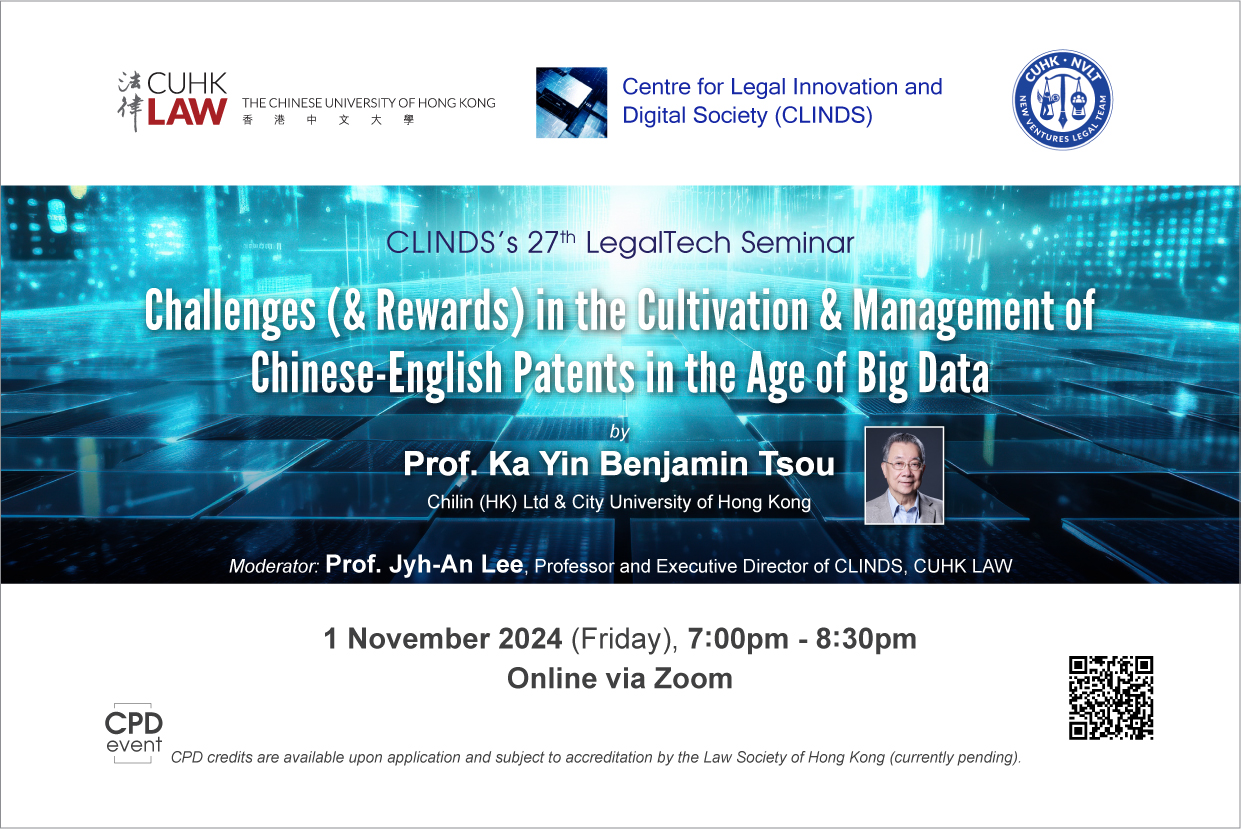活动
CUHK LAW CLINDS’s 27th LegalTech Seminar – ‘Challenges (& Rewards) in the Cultivation & Management of Chinese-English Patents in the Age of Big Data’ by Prof. Ka Yin Benjamin Tsou (Online)
2024年11月1日
7:00 pm – 8:30 pm (HKT)
Online via Zoom
Dr. Tsou is a graduate of Harvard University and University of California Berkeley. He specializes in computational linguistics, including Natural Language Processing and Machine Translation. He led two projects under the Hong Kong Judiciary to produce bilingual court judgements after 1997 and subsequently worked on bilingual patent processing. His research group helped to organize the Chinese-English Patent Machine Translation Competition (Tokyo, 2009). His current work at Chilin (HK) Ltd, which he founded, is supported by the Hong Kong Innovation and Technology Commission. It focuses on AI and Machine Translation Post-Editing and draws on a massive database of bilingual patents, specially cultivated since 2007 (https://chilin.hk/patta/) and another Chinese news media text corpus (https://en.wikipedia.org/wiki/LIVAC_Synchronous_Corpus). He is also the Emeritus Professor of Language Sciences at the City University of Hong Kong as well as an Adjunct Professor at HKUST, and the Founding President of the Asian Federation of Natural Language Processing. Among his many publications is: 香港法律語言常見拉丁詞彙 Common Latin Terms in Hong Kong Legal Language (2021), City University of Hong Kong Press.
https://cloud.itsc.cuhk.edu.hk/webform/view.php?id=13697839
Registration Deadline: 31 October 2024, 2:30pm (HKT)
Patents have provided a legal framework to protect intellectual property rights. There are also traded commodities. In recent years, patents originating from China have seen phenomenal growth along with bilingual patent processing, which includes translation between Chinese and other languages with heightened expectations on quality. As part of AI, Machine Translation (MT) is also evolving rapidly. It is now used for many translation tasks, including preliminary patent translation, which, like other high-value documents, requires human post-editing to ensure top final quality. With the arrival of Generative-AI, fluency of MT output has significantly improved. However, fidelity or accuracy in translation remains a problem, especially with scientific and technological terminology and between Chinese and English. Thus, an important problem is to provide tools to help the post-editor to (1) evaluate the quality of the MT and (2) to improve final accuracy. In this presentation, we compare the accuracy of MT results between some top MT suppliers and ChatGPT based on expert human evaluation as well as some objective metrics, including one based on terminological usage among a specially cultivated corpus of 300,000 comparable Chinese-English patents. We shall explore some major challenges facing any system to optimize the output of the final quality assurance process through AI-mediated post-editing.
Language: English
*CPD credits are available upon application and subject to accreditation by the Law Society of Hong Kong (currently pending).


